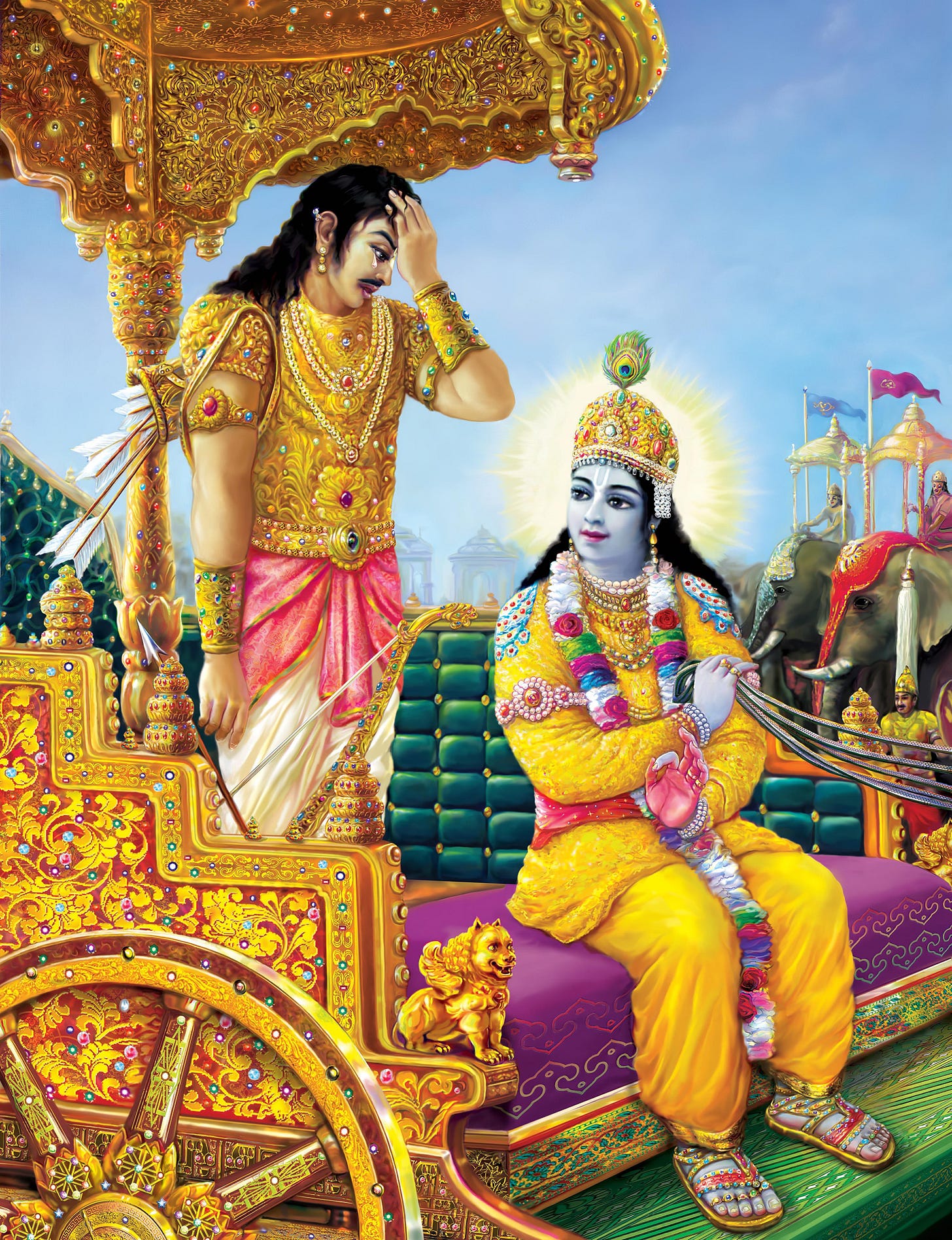Arjuna decides to not fight (Bg 1.44 and 1.45)
Arjuna's knowledge was not sufficient to solve his dilemma. In the following chapters, Krsna will give him superior knowledge that will gradually destroy all his doubts and indecision.
« The Song of God: An in-depth study of the Bhagavad-gītā (Volume 1)
Verse 44: aho bata mahat pāpam, kartum vyavasitā vayam
yad rājya-sukha-lobhena, hantum sva-janam udyatāḥ
Alas, how strange it is that we are preparing to commit greatly sinful acts. Driven by the desire to enjoy royal happiness, we are intent on killing our own kinsmen.
Verse 45: yadi mām apratīkāram, aśastram śastra-pāṇayaḥ
dhārtarāṣṭrā raṇe hanyus, tan me kṣema-taram bhavet
Better for me if the sons of Dhṛtarāṣṭra, weapons in hand, were to kill me unarmed and unresisting on the battlefield.
The reasons given by Arjuna in the first chapter are correct from an ordinary moral standpoint. Although Arjuna was confused and afraid due to material attachment, he was presenting his arguments based on what he heard from authorities.
On the other hand, we can see that this knowledge is not sufficient to solve his dilemma. In the following chapters, Krsna will give him superior knowledge that will gradually destroy all his doubts and indecision.
Ordinarily, peace is better than war, and forgiveness is better than seeking justice. According to the Vedas, six kinds of aggressors may be killed without incurring sin, including one who gives poison, one who sets fire to one's house, one who attacks with deadly weapons, etc. The Kauravas did all of these to the Pandavas, and Arjuna was still prepared to forgive and allow them to keep the kingdom they stole, which speaks volumes about his magnanimity. As Prabhupada mentions "As a pure devotee of the Lord, Arjuna had no desire to fight with his cousins and brothers, but he was forced to come onto the battlefield by the obstinacy of Duryodhana, who was never agreeable to any peaceful negotiation."
There is however a greater principle that is the concept of dharma. In Varṇāśrama society, different duties are applied to different people. Forgiveness is very appropriate for a brāhmaṇa, but Arjuna is not a brāhmaṇa, but a kṣatriya, and as such his dharma is not forgiveness, but applying justice. A brāhmaṇa may forgive exactly because someone else, a king or law enforcer, can take care of making justice. As a kṣatriya, Arjuna is precisely such a person and he has the duty of fighting to uphold the principles of dharma. Just as it is sinful for a brāhmaṇa to take weapons and kill, for a kṣatriya it is sinful to refuse to fight when there is real necessity.
A still higher principle, however, which will be presented later in the Bhagavad-gītā, is that Arjuna should fight because that is the desire of the Lord. The Lord has a plan, and cooperating in the Lord's plan is the highest dharma.
We can see that dharma is a complicated concept. It is multifaceted and multilayered and what appears to be correct on one level, is not necessarily correct in a higher platform or a different situation. However, acting in devotional service and dedicating our activities to the Lord is beyond mundane dharma, and when we learn this art, as Krsna explains in the Gītā, we can find our way out of the cycle of birth and death.
Main points in the purports of Srila Prabhupada:
"Alas, how strange it is that we are preparing to commit greatly sinful acts. Driven by the desire to enjoy royal happiness, we are intent on killing our own kinsmen."
a) People can kill even close family members for some personal gain, but Arjuna is aware of moral principles and wants to avoid such a situation. "Better for me if the sons of Dhṛtarāṣṭra, weapons in hand, were to kill me unarmed and unresisting on the battlefield."
a) To avoid the fight, Arjuna is prepared to be killed without offering resistance. This is due to his soft-heartedness due to being a great devotee.
« The Song of God: An in-depth study of the Bhagavad-gītā (Volume 1)


